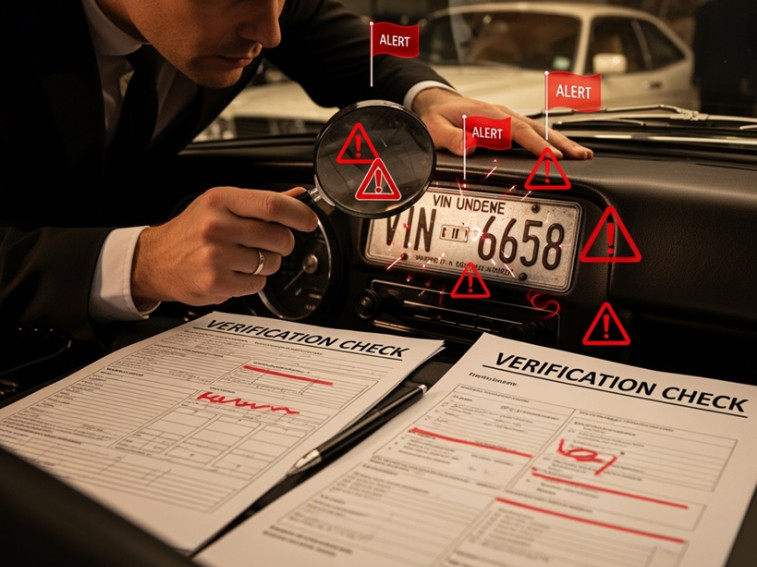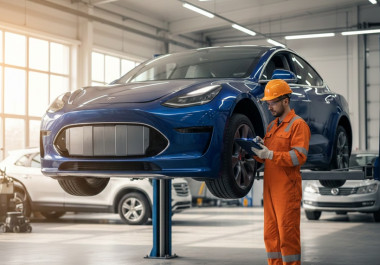Navigating the world of vehicle auctions can be both exciting and challenging, especially when it comes to ensuring that you never end up with a stolen car. Whether you're a seasoned collector focused on specialty and rare car auctions or a business owner in search of that perfect addition to your fleet, being equipped with the right knowledge is essential. In this guide, essential strategies for Identifying Stolen Cars at Auction are explored, along with practical Auction fraud detection tips to protect your investment.
Understanding the Risks and Why It Matters
The energy of an auction - when you're in the thick of bidding - can sometimes mask potential pitfalls. Criminals may try to pass stolen vehicles off as genuine, targeting those who might not be familiar with the red flags. Even though reputable platforms take great care to verify each listing, the responsibility of protection also lies with the buyer. This guide is designed to equip buyers with the expertise needed to spot warning signs quickly, ensuring they steer clear of fraudulent deals that could cost them dearly, both financially and legally.
Recognising the Common Red Flags
Stolen vehicles often exhibit inconsistencies that experienced buyers can recognise. Here are the key indicators that something might be amiss:
Discrepancies in the Vehicle Identification Number (VIN)
The VIN is unique to each vehicle and acts like its fingerprint. When it comes to Identifying Stolen Cars at Auction, a mismatched or altered VIN is one of the first clues that a vehicle might be illegitimate. Watch out for:
Mismatch between documents and physical VIN: Ensure that the number on the dashboard, engine bay, and paperwork match exactly.
Visible signs of tampering: Look for scratches, uneven engraving, or evidence of re-stamping on the VIN plate.
Using trusted databases to run a comprehensive vehicle history check is a crucial step that can save buyers from potential scams.
Incomplete or Altered Documentation
Documentation should be thorough and consistent. Missing or contradictory paperwork can often signal trouble. In particular:
Missing vehicle history: Gaps in service records or registration details may indicate that the history has been deliberately obscured.
Signs of document tampering: Look for broken seals on official papers or inconsistencies in the colour and format of the documents.
Trustworthy auction houses ensure all vehicles come with complete, verified records. If the seller hesitates to provide full documentation, consider it a warning sign.
Unusually Low Prices and Over-Eager Sellers
One of the classic warnings in any auction is a price that seems too good to be true. Criminals sometimes use attractive price tags to entice quick decisions:
Low prices compared to market value: Especially in specialty and rare car auctions, if a vehicle is priced significantly lower than similar models, it may be a red flag.
Pressure tactics from the seller: If you're being pushed for a quick deal or the seller urges you to conduct business off-platform, be cautious.
Take a moment to research and compare similar listings through vehicle auctions - this comparison approach is one of the best protective measures you can follow to avoid falling prey to scams.
Essential Steps for Verifying a Vehicle's Authenticity
To fortify your bidding strategy, there are several steps you can take to verify that the car you're eyeing is genuine:
Check the VIN Thoroughly
Start with the basics. The VIN should be the same on all documentation and visible parts of the vehicle. To validate it:
Run a vehicle history report: Use reliable websites to check for any inconsistencies, including previous reports of theft or insurance claims.
Cross-check across sources: Compare the VIN information from the seller with public records and databases.
This straightforward process is a cornerstone in verifying vehicle authenticity and an effective method to ensure you're not misled.
Verify the Registration Papers
Closely examine the vehicle's registration documents:
Confirm details with official records: Where possible, verify the registration information with government or official automotive databases.
Look for authenticity markers: Genuine documents often have watermarks, secure seals, or certification stamps from the issuing authority.
If any discrepancies appear, it's wise to take a step back from the deal until you can confirm the facts.
Inspect the Vehicle in Person
Whenever possible, seeing the car in person can unveil issues that photos and documents cannot:
Request a detailed inspection: If you cannot attend the auction physically, see if the platform offers live video tours or independent third-party inspections.
Look for physical signs of tampering: Repainted sections, mismatched body panels, or any signs of hurried repairs can be indicative of past damage or attempts to disguise illegal activity.
A thorough physical inspection acts as one of the final safeguards before placing a bid.
Identifying Stolen Cars at Auction: Key Strategies
For buyers in specialty and rare car auctions, attention to detail is paramount. Here are strategies tailored to this niche market:
Enhanced Documentation and Provenance Verification
With specialty vehicles, the history is often as valuable as the car itself:
Ask for a detailed provenance: In addition to standard documentation, seek certificates of authenticity and detailed service histories.
Consult experts: Specialists in classic and rare cars can provide insights that may not be obvious to the untrained eye.
Leverage Expert Appraisals
For high-value transactions, consider having the vehicle appraised by an independent expert before bidding. Their insights can reveal subtle clues that might indicate the car is not as it seems.
Engage With the Collector Community
Joining car collector forums and attending niche events can provide additional layers of assurance. Fellow enthusiasts often share their experiences with fraud prevention strategies and may help you avoid known pitfalls in the market.
Practical Auction Fraud Detection Tips for Smart Buyers
Staying one step ahead in the auction room requires preparation and a healthy dose of scepticism. Here are some actionable protective measures you can implement right away:
Do Your Homework
Before even placing a bid, research is your best defence:
Review past auction records: Look up the history of similar vehicles to understand common pricing strategies.
Examine seller reviews: Established platforms like RAW2K often have detailed buyer feedback that can alert you to potential issues.
Ask the Right Questions
A reputable seller will be transparent when you ask questions:
Enquire about the vehicle's history: Ask for additional details if anything in the documentation seems off.
Request an extended inspection: Sometimes, a live demonstration or additional photographs of key areas (like the VIN) can provide the needed reassurance.
Take Your Time
One of the most important protective strategies is to never rush the process:
Review every detail carefully: An impulsive purchase can lead to regrets if a red flag is overlooked.
Don't be swayed by seller pressure: A legitimate seller will respect your need for thoroughness.
The Role of Trustworthy Auction Houses
Choosing a reputable auction platform is a significant step in mitigating risk. Platforms such as RAW2K adhere to stringent verification processes to protect both buyers and sellers:
Comprehensive inspections: Vehicles listed on respected platforms come with in-depth reports and verified histories.
Dedicated support channels: Should you have doubts or require further clarification, reliable platforms offer immediate customer assistance.
By working with established auction houses, you further enhance the security of your transaction and benefit from their integrated safety measures. Exploring online car auctions through reputable platforms provides peace of mind throughout the bidding process.
A Memorable Lesson: Learning Through Experience
A seasoned collector once shared a memorable experience at an auction for a rare sports car. Despite the car's pristine appearance and attractive pricing, the collector noticed a slight discrepancy in the VIN. Trusting their instincts and using the available vehicle history resources, they discovered that the documentation had indeed been tampered with. This episode reinforced the importance of vigilance and thorough verification - essential practices for anyone serious about Identifying Stolen Cars at Auction.
This firsthand account is just one example of how a careful approach and adherence to proper verification methods can protect buyers from costly mistakes.
Empower Yourself With Knowledge
Knowledge is your best weapon in the fight against fraud. Keeping current with the latest trends in vehicle scams and protective strategies can help you stay ahead. Consider the following:
Update your resources: Regularly review trusted websites and forums dedicated to vehicle auction safety.
Build a checklist: Develop a list of standard verification steps to follow every time you participate in an auction.
Network with experts: Engage with professionals in the industry who can offer insights and advice on detecting fraudulent vehicles.
What to Do If You Suspect a Vehicle May Be Stolen
Even if you follow all the recommended steps, you might still encounter a vehicle that raises concerns. Here's what you should do immediately:
Contact the Auction House
If something seems off:
Reach out for clarification: Reputable auction houses are committed to transparency and will investigate any reported discrepancies.
Provide detailed feedback: Explain the inconsistencies you have observed and request a further review of the vehicle documentation.
Report to Authorities
When your suspicions are high, it is crucial to involve the proper authorities:
Submit a detailed report: Contact the local police or appropriate law enforcement agency with all the information you have gathered.
Follow official procedures: Await further instructions before proceeding with any bidding or purchase.
Seek an Independent Expert Opinion
When in doubt, it's always wise to get a second opinion:
Consult with a trusted mechanic or specialist: Their objective evaluation could uncover hidden issues or confirm your suspicions.
Consider legal advice: Especially for high-value or specialty vehicles, professional legal guidance can be invaluable.
In Summary: Stay Informed and Bid Safely
The thrill of bidding at an auction should never come at the expense of your security. By learning how to spot the subtle red flags - using practical Auction fraud detection tips and strategies for Identifying Stolen Cars at Auction - you set yourself up for success. The rewards of a genuine and transparent auction far outweigh the risks when you know what to look for.
In your journey through the world of specialty and rare car auctions, remain vigilant, do your homework, and trust your instincts. Platforms like RAW2K have built their reputation on transparency, quality, and robust verification processes that ensure your bidding experience is not only exciting but also secure.
If you ever have uncertainties or need additional assistance, don't hesitate to contact us for expert guidance. Protecting your investment is a shared responsibility, and with the right knowledge and trusted resources, you can bid with confidence and enjoy the full benefits of a modern, digital auction marketplace.
For those ready to begin their auction journey with confidence, register to bid and explore secure opportunities. Embrace the chance to join a community of buyers who prioritise safety and authenticity - empowered by proper verification methods and strategic approaches. Happy bidding!




